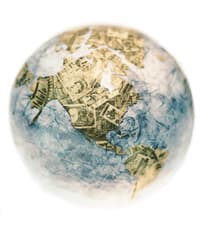street
sense
Debate Rages Over "Outsourcing"
When U.S. companies move jobs to other countries,
are they staying competitive or ruining our economy?

In November, voters will determine whether we'll have a continuation of the George W. Bush administration, or a change in leadership to a new president, Democrat John Kerry.
And while the two leaders differ on numerous domestic and international questions, their respective positions on what's become known as "outsourcing" may well become the polarizing issue that determines the outcome of the election.
This month, I'll explain why outsourcing is such a key issue, and why there are no easy answers as to whether it's a good or bad thing.

In its simplest terms, outsourcing is the transfer of jobs by U.S. companies from facilities in this country to lower-cost locations in other countries. Outsourcing was until recently synonymous with the movement of manufacturing jobs offshore, but now outsourcing can include such activities as computer programming, software development and even the operation of large-scale telephone "call centers."
Advocates of job transfer argue that outsourcing is simply a function of the free market -- a practice that allows U.S. companies to remain competitive in what has become a truly global marketplace.
Those who favor outsourcing say that the United States has always been able to find new areas of job growth because of our worldwide leadership positions in technology and productivity.
In other words, the advocates of outsourcing claim that we've been able to replace the jobs that leave our shores with new jobs in emerging and/or growing industries. And in the past this has been essentially true, though pockets of dislocated workers -- for example, those in the textile industry -- have suffered greatly in the process.
To an outsourcer, converting a shuttered textile mill in New England into space for a fast-growing producer of electronic components is a form of "economic Darwinism" that drives U.S. investment into the areas in which we can be the most competitive.
Opponents Cry Foul
Opponents of outsourcing tend to recognize the need for America to remain competitive, but they claim that this country is needlessly losing jobs because of unfair trade agreements and greedy corporations.
Those against outsourcing say countries such as Mexico and China attract companies by offering more than cheap labor. They argue that these countries also allow companies to ignore such basic responsibilities as providing environmental safeguards and giving workers even minimal benefits.
Most opponents of outsourcing don't mind when a U.S. company opens a factory in Mexico to supply the Mexican market. What they do mind is when a U.S. company opens a plant in Mexico and then produces products for sale back into the United States.
Who's Right?
Members of the Bush administration have made the point that outsourcing is essentially positive because it helps create a worldwide middle class who can afford to buy American products.
Democrats point to major job losses in this country and warn that if we continue to lose our manufacturing base we won't be able to make the basic materials, like steel, that we must have for our national defense.
Republicans want free trade. Democrats seek protection for American jobs. An election may hinge on who wins this debate.
Ophthalmology Management Senior Associate Editor Jerry Helzner has written more than 50 articles on stock investing for Barron's. He has been a regular stock market columnist for other business publications and was a member of the equity research department of a major regional brokerage firm. E-mail your stock market questions to him at helznergi@boucher1.com.








